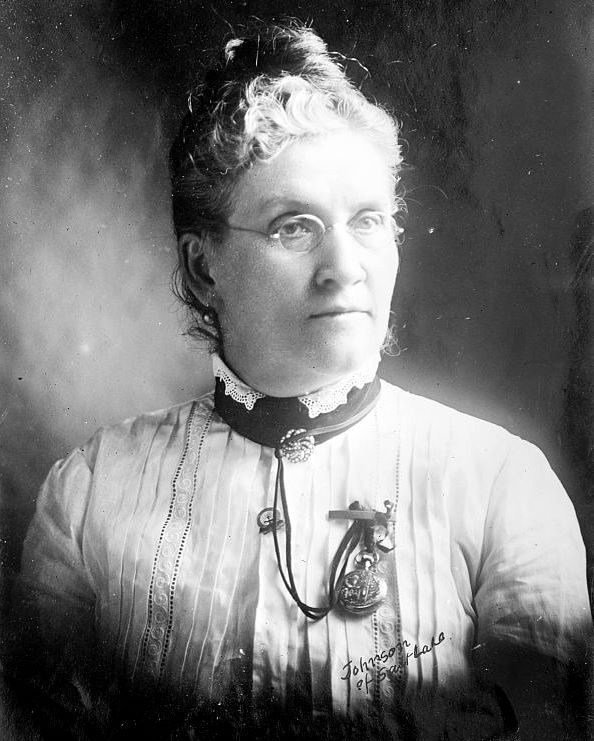
I’m grateful to my longtime friend and former Maxwell Institute colleague for bringing this piece from the April 1905 issue of The Improvement Era to my attention. It was written by Susa Young Gates (1856-1933), a daughter of Brigham Young who rose to prominence in her own right as a writer, editor, genealogist, and advocate of women’s rights and women’s suffrage. Among many other things, she founded the Department of Music at what was then the Brigham Young Academy in Provo, Utah; served on the board of regents for both Utah State Agricultural College (the future Utah State University) and Brigham Young University; founded the Young Women’s Journal and the Relief Society Magazine; wrote two novels, a biography of her father, a history of Mormon women, and other books; and, with her husband, served two missions to the “Sandwich Islands” (the Kingdom of Hawaii).
THE APOSTATE.
There’s the apostate, now. He’s a queer creature. Very
queer! He has some remarkable notions. And no matter who he
is, or when he apostatized, he is all alike in some things. For instance,
he always feels very much abused. No matter what has
been done, or what left undone; your apostate, if he is the genuine
article, feels that any number of people have been in league
against him. Of course, there are those who simply drift out of
the Church through indifference or general neglect. And indifferent
and neglectful they generally remain. Again, there are those
who leave other churches. But someway, such people never
manifest the real apostate spirit. For they fail to manifest the
infallible signs. Diagnose these cases, and the true symptoms
will be found absent. One apostatizes only from truth, not error.
But to return to our simon-pure apostate; for he generally turns
on us. He not only feels he is abused, but in the abandonment of
his self-piety he pictures whole cohorts of persons who hare been
conspiring for his overthrow. Symptom number one.
The next stage of his malady is exhibited when he begins to
think he is twenty years ahead of the Church. The Church, according
to him, is a good, old, doddering idiot, who has been a
pretty fair specimen at one time, but now has lagged miles, leagues,
eons behind your anxious apostate. If this—and but that—and
perhaps in the days to come, if the Church can only be persuaded
to get a hurry on itself—well, you know, it might be possible, in
some dim and distant future for the poor old Church to catch the
apostate and its own breath at the same time, and proudly linking
arms with the soulful and condescending whilom apostate, together
they might travel the comfortable broad way that leads to, you
know where! Oh yes, and how graciously will your kingly apostate
then forgive his long-time delinquent brethren, and how munificent
will be his gifts, and self-applied donations; and how magniloquently
will he pour out his healing eloquence to soothe all the
wicked leaders who will then have repented and come bending and
crawling to him. The picture of all this makes him weep in the
night. And he weeps! Symptom number two!
Then this self-righteous individual, we are discussing, has another
profound conviction: this usually is in the last stages of the
complaint, and occurs about the time the oflicers have had to
quarantine him; he resents being told of his affliction. It hurts
his sensitive feelings to be told that he is an apostate. He is
nothing of the kind! Don’t you dare —. The story of the Indian
here comes to mind, “Me no lost,” grunts the wandering Lo,
“me no lost, wickiup lost!” And that’s the case with our impatient
patient; he hasn’t apostatized, not he! It’s the Church that’s
apostatized! He has fought and bled all his life for the same
things for which he is fighting and bleeding now, so to speak! He,
the great, the good, the only, he apostatized? Perish the thought,
and with it the four hundred and fifty thousand people who think
the thought! And most of all, perish the local, stake or general
authorities who are in the direct line of our apostate’s vision.
Down with the priesthood! Up with unbridled license! And thus
ends symptom number three.
If the patient then gets the rabies, and goes out clothed with
indignation and with flames bursting from his mouth, he is in the
last stages of decomposition, and everybody should get out of the
way. Keep out of the chamber of death and despair, unless duty
calls you within. Then hang up all the disinfectants you can procure;
be exceedingly careful of contagion, for the disease is
said to be very catching for relatives and friends; cover up the
mal- odorous remains of what was once a friend and brother, and
depart as quickly as may be. Let us consign the rest to oblivion.
Dost like the picture? Then avoid the disease!
Susa Young Gates.











